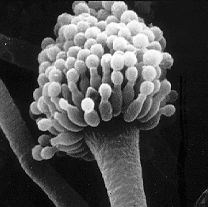Imperfect fungi
| Fungi imperfecti | |
|---|---|
 |
|
| Conidiophore of Aspergillus sp. | |
| Scientific classification | |
| Kingdom: | Fungi |
| Species | |
|
See below. |
|
See below.
The Fungi imperfecti or imperfect fungi, also known as Deuteromycota, are fungi which do not fit into the commonly established taxonomic classifications of fungi that are based on biological species concepts or morphological characteristics of sexual structures because their sexual form of reproduction has never been observed; hence the name "imperfect fungi." The phylogenetic line can be traced back to the point where these species hoard some of the rudimentary characteristics that could imply information sufficient to redirect them into the known and confirmed taxon. Only their asexual form of reproduction is known, meaning that this group of fungi produce their spores asexually, in the process called sporogenesis.
There are about 25,000 species that have been classified in the deuteromycota and many are basidiomycota or ascomycota anamorphs. Fungi producing the antibiotic penicillin and those that cause athlete's foot and yeast infections are imperfect fungi. In addition, there are a number of edible imperfect fungi, including the ones that provide the distinctive characteristics of Roquefort and Camembert cheese.
Other, more informal names besides Deuteromycota ("Deuteromycetes") and fungi imperfecti are anamorphic fungi, or mitosporic fungi, but these are terms without taxonomic rank. Examples are Alternaria, Colletotrichum, Trichoderma etc.
Although Fungi imperfecti/Deuteromycota is no longer formally accepted as a taxon, many of the fungi it included have yet to find a place in modern fungal classification. This is because most fungi are classified based on characteristics of the fruiting bodies and spores produced during sexual reproduction, and members of the Deutromycota have only been observed to reproduce asexually or produce no spores.
...
Wikipedia
